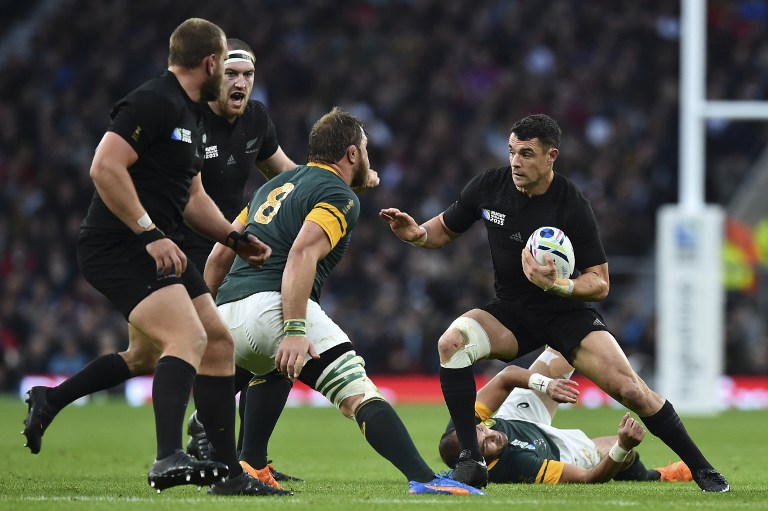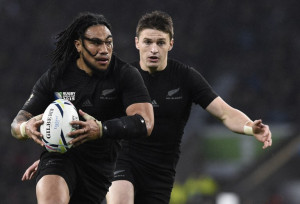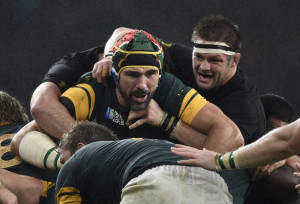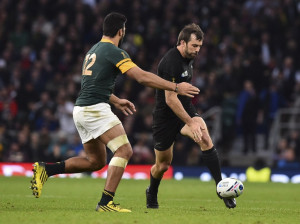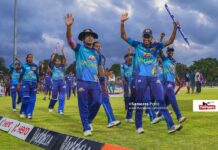Two teams that can quite possibly lay claim to the title of the greatest rivalry in Rugby Union history the New Zealand All Blacks and South African Springboks, went at each others throats for 80 minutes in the first semi final of the Rugby World Cup.
Although the New Zealand went into the contest as the favored team nobody expected it to be an easy ride to the finals. As anticipated the Springboks threw everything at the defending champions and came very close to upsetting the All Black apple cart.
Many pundits predicted a closely contested physical encounter with the breakdown being a key aspect in the game. With both teams having exceptional loose forwards a lot was riding on who won the battle breakdown and quite frankly it is impossible to tell who actually won this area of the game. Both teams were relentless in this area with the All Blacks picking up 9 turnovers whilst the Springboks managed 6. Perhaps the telling stat though is that the All Blacks won 8 of those 9 in South Africa’s half.
Another area of the game under scrutiny was the set pieces. In the scrums South Africa had the upper hand winning 2 penalties at scrum time and managed one outright steal. As for the lineouts the All Blacks took the upper hand managing 4 steals. The other set piece that many people underestimate, is the importance of is restarts. New Zealand completely changed their strategy at kick-offs which was perhaps crucial in the winning of this game. All through the World cup we have seen the All Blacks kick short in attempts to regain possession off the restart but over the course of the 80 minutes of the semi final, the All Blacks repeatedly kicked deep into the Springbok half. This was a brilliant option and showed the strategic mind of the Kiwi coaching staff. They had scouted the South Africans and realized that they had a very weak exit strategy.
The All Blacks focus on territory kept the Bokke pinned inside their own half and unable to get into attacking positions. South Africa had only one kicking option in Handre Pollard and frankly he seemed to be struggling with his clearance kicking and the All Blacks exploited it all through the game. The kiwis even opted to put kicks into the corner from areas they would usually run with all their slipping in little grubber kicks as well chips behind the Springboks. This also forced the backs to sit back a bit in defense which in turn gave the All Blacks room to run when they wanted to.
New Zealand seemed to be a little indisciplined in the first half, even though their defense held strong and they were able to keep pushing South Africa deep into their own half they were conceding a few too many penalties in crucial areas which helped the Bokke stay in the game and even lead going into halftime.
However their game management and control was brilliant when it counted. Even with a man in the sin bin at half time the experience and composure they showed at the start of the second half was magnificent. After trailing by 5 points at the halfway point they led by 5 within 12 minutes of the second half. The major turning point came when Dan Carter slotted over a dropped goal with nothing on. Carter’s timing was perfect and his technique was masterful. The Blacks had just fumbled a line-out and barely managed to retain possession, Carter knocked it over whilst his team was on the back foot.
South Africa on the other hand seemed to be very one dimensional in attack. They were very narrow with their forwards trying to rumble forward followed up with a big up and under kick and chase from the backs. This ploy worked well early on as their outside backs did very well in the air. However the All Blacks back three were equal to the task in the second half and completely nullified the Bokke aerial domination.
South Africa also seemed too fatigued in the second half with their bigger players falling off tackles and whilst their runners were not at full speed. South Africa was forced to sustain a lot of pressure through the tournament following their loss to Japan in the first game of the tournament. The Springboks were forced to front up both physically and mentally, having to play with knockout game mentality in every game.
The All Blacks coaching staff and decision makers played a massive role in the win on Saturday. The amount of preparation in the build up to the game was clearly visible on the field. The way their game evolved in the rain was the result of clear perfect planning. Instead of throwing their patented 50/50 passes and back door off loads, they held on to the ball and closed out the game. Additionally the substitutions Steve Hanson made were impeccable. He brought on all the right players at the right time and they slipped into the team seamlessly.
The vast experience of the leaders on the field won them the game eventually for the Kiwis. The likes ofMcCaw, Carter, Nonu and Conrad Smith made all the correct decisions in the second half when it mattered the most. They took complete control of the game and remained calm as they went about closing out the game. Dan Carter proved exactly why he is quite possibly the greatest player in the game, his performance was simply sublime. He controlled the game beautifully as he marshaled the back line to perfection. His tactical kicking was near perfect both defensively and in attack and his goal kicking was on point, missing just one penalty which bounced off the goal post.
New Zealand’s performance on the day was perhaps not as flashy or as exciting as it was in their quarterfinal against the French, but they did what they needed to be done to get the job done. They played the weather conditions and their opponents to perfection. They won the game not through brilliant handling and flamboyant rugby but through a master-class in tactics and game control.

